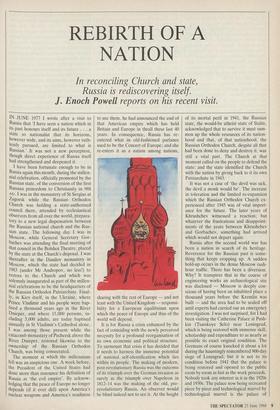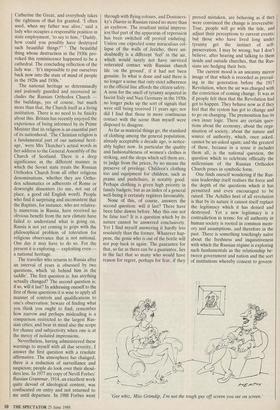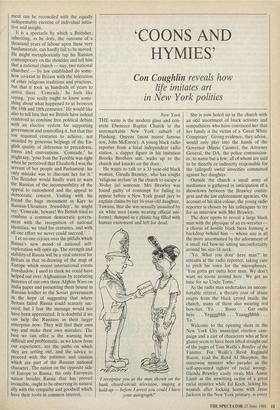REBIRTH OF A NATION
In reconciling Church and state, Russia is rediscovering itself.
J. Enoch Powell reports on his recent visit.
IN JUNE 1977 I wrote after a visit to Russia that 'I have seen a nation which in its past honours itself and its future . . . a state so nationalist that its horizons, however wide, and its aims, however ruth- lessly pursued, are limited to what is Russian.' It was not a new perception, though direct experience of Russia itself had strengthened and deepened it. I have been fortunate enough to be in Russia again this month, during the millen- nial celebration, officially promoted by the Russian state, of the conversion of the first Russian princedom to Christianity in 988 AD. I was in the monastery of St Sergius at Zagorsk while the Russian Orthodox Church was holding a state-authorised council there, attended by ecclesiastical observers from all over the world, prepara- tory to a new legal dispensation between the Russian national church and the Rus- sian state. The following day I was in Moscow, while General Secretary Gor- bachev was attending the final meeting of that council in the Bolshoi Theatre, placed by the state at the Church's disposal. I was thereafter in the Danilov monastery in Moscow, which the state had decided in 1983 (under Mr Andropov, no less!) to restore to the Church and which was solemnly inaugurated as part of the millen- nial celebrations to be the headquarters of the Russian Orthodox Patriarchate. Final- ly, in Kiev itself, in the Ukraine, where Prince Vladimir and his people were bap- tised a thousand years ago in the River Dnieper, and where 15,000 persons, in- cluding 3,000 adults, are today baptised annually in St Vladimir's Cathedral alone, I was among those present while the catacomb monastery of Pechersk above the River Dnieper, restored likewise to the Ownership of the Russian Orthodox Church, was being consecrated.
The moment at which the millennium fell was an auspicious one. A week before, the President of the United States had done more than renounce his definition of Russia as 'the evil empire'. By acknow- ledging that the peace of Europe no longer depends (if it ever did) upon America's nuclear weapons and America's readiness to use them, he had announced the end of that American empire which has held Britain and Europe in thrall these last 40 years. In consequence, Russia has re- entered what in old-fashioned parlance used to be the Concert of Europe; and she re-enters it as a nation among nations, sharing with the rest of Europe — and not least with the United Kingdom — responsi- bility for a European equilibrium upon which the peace of Europe and thus of the world will depend.
It is for Russia a crisis enhanced by the fact of coinciding with the newly perceived necessity for a profound reorganisation of its own economic and political structure. To surmount that crisis it has decided that it needs to harness the immense potential of national self-identification which lies within its people. The making of modern, post-revolutionary Russia was the outcome of its triumph over the German invasion as surely as the triumph over Napoleon in 1812-14 was the making of the old, pre- revolutionary Russia. An observer would be blind indeed not to see it. At the height
of its mortal peril in 1941, the Russian state, the would-be atheist state of Stalin, acknowledged that to survive it must sum- mon up the whole resources of its nation- hood and that, of that nationhood, the Russian Orthodox Church, despite all that had been done to deny and destroy it, was still a vital part. The Church at that moment called on the people to defend the state; and the state identified the Church with the nation by giving back to it its own Patriarchate in 1943.
It was not a case of 'the devil was sick, the devil a monk would be'. The increase in toleration and the limited re-expansion which the Russian Orthodox Church ex- perienced after 1945 was of vital import- ance for the future. The later years of Khrushchev witnessed a reaction; but whatever the frustrations and disappoint- ments of the years between Khrushchev and Gorbachev, something had arrived which would not depart again.
Russia after the second world war has been a nation in search of its heritage. Reverence for the Russian past is some- thing that keeps cropping up. A sudden hold-up occurs in the dense Moscow rush- hour traffic. There has been a diversion. Why? It transpires that in the course of engineering works an archaeological site was disclosed — Moscow is deeply con- scious of having been an inhabited place a thousand years before the Kremlin was built — and the area had to be sealed off until experts had carried out an emergency investigation. I was not surprised, for I had been visiting the Catherine Palace at Push- kin (Tsarskoye Selo) near Leningrad, which is being restored with immense skill, scholarship and expenditure to as nearly as possible its exact original condition. The Germans of course knocked it about a lot during the hauntingly remembered 900-day siege of Leningrad; but it is not to its condition before 1941 that the palace is being restored and opened to the public room by room as fast as the work proceeds. Nobody took any interest in it in the 1920s and 1930s. The palace now being recreated piece by piece and technological marvel by technological marvel is the palace of Catherine the Great, and everybody takes the rightness of that for granted. 'I often used, when my father was alive,' said a lady who occupies a responsible position in state employment, 'to say to him, "Daddy, how could you possibly have destroyed such beautiful things?" ' The beautiful thing whose destruction in the 1930s pro- voked this reminiscence happened to be a cathedral. The concluding reflection of the lady was : 'It's impossible to put ourselves back now into the state of mind of people in the 1920s and 1930s.'
The national heritage so determinedly and jealously guarded and recovered in- cludes the Russian Orthodox Church the buildings, yes of course, but much more than that, the Church itself as a living institution. There is no need to be finicky about this. Britain has recently enjoyed the experience of being informed by its Prime Minister that its religion is an essential part of its nationhood. 'The Christian religion is a fundamental part of our national herit- age,' were Mrs Thatcher's actual words in her address to the General Assembly of the Church of Scotland. There is a deep significance in the different manner in which the Soviet state treats the Russian Orthodox Church from all other religious denominations, whether they are Ortho- dox schismatics or adherents of Rome or downright dissenters (to use, not out of place, a good old English word). People who find it surprising and inconsistent that the Baptists, for instance, who are relative- ly numerous in Russia, have received no obvious benefit from the new climate have failed to understand what is going on. Russia is not yet coming to grips with the philosophical problem of toleration for religious observance that is not national. One day it may have to do so. For the present it is exploring — exploiting even a national heritage.
The traveller who returns to Russia after an interval of years is obsessed by two questions, which 'sit behind him in the saddle'. The first question is: has anything actually changed? The second question is: if so, will it last? In addressing oneself to the first of those questions it is wise to apply all manner of controls and qualifications to one's observation: beware of finding what you think you ought to find; remember how narrow and perhaps misleading is a comparison restricted to the largest Rus- sian cities; .and bear in mind also the scope for chance and subjectivity when one is at the mercy of isolated impressions.
Nevertheless, having administered these warnings to myself with all due severity, I answer the first question with a resolute affirmative. The atmosphere has changed; there is a reduction of surveillance and suspicion; people do look over their shoul- ders less. In 1977 my copy of Nevill Forbes' Russian Grammar, 1914, an excellent work quite devoid of ideological content, was confiscated on entry and not returned to me until departure. In 1988 Forbes went through with flying colours, and Dostoievs- ky's Diaries in Russian raised no more than an eyebrow. The resultant initial impress- ion that part of the apparatus of repression has been switched off proved enduring. Unless one expected some miraculous col- lapse of the walls of Jericho, there un- doubtedly is a different 'feel' in the air, which would surely not have survived reiterated contact with Russian church life 'on the ground', if it had not been genuine. In what is done and said there is no longer a sense that only strict adherence to the official line affords the citizen safety. A nose for the smell of tyranny acquired in fascist Italy and Nazi Germany in the 1930s no longer picks up the sort of signals that were still being received 11 years ago; nor did I find that those in more continuous contact with the scene than myself were disposed to disagree.
As far as material things go, the standard of clothing among the general population, already acceptable a decade ago, is notice- ably higher now. In particular the quality and fashionableness of women's clothes is striking, and the shops which sell them are, to judge from the prices, by no means the preserve of privilege. Children's clothing too and equipment for children, such as prams and pushchairs, is notably good. Perhaps clothing is given high priority in family budgets; but as an index of a general well-being it certainly registers favourably.
None of this, of course, answers the second question: will it last? There have been false dawns before. May this one not be false too? It is a question which by its nature cannot be answered conclusively. Yet I find myself answering it hardly less resolutely than the former. Whatever hap- pens, the genie who is out of the bottle will not pop back in again. The guarantee for that, so far as there can be a guarantee, lies in the fact that so many who would have reason for regret, perhaps for fear, if they proved mistaken, are behaving as if they were convinced the change is irreversible. True, people will go with the tide, and adjust their perceptions to current events; but those who have lived long under tyranny get the instinct of self- preservation. I may be wrong; but I don't believe, after hearing and talking to them inside and outside churches, that the Rus- sians are hedging their bets.
The current mood is an uncanny mirror image of that which is recorded as prevail- ing in the generation before the 1917 Revolution, when the air was charged with the conviction of coming change. It was as if people felt then that the Revolution had got to happen. They behave now as if they feel that the system has got to change and to go on changing. The premonition has its own inner logic. There are certain ques- tions about the economy, about the orga- nisation of society, about the nature and source of authority, which, once asked, cannot be un-asked again; and the greatest of these, because in a sense it includes them all, is the national question, the question which to celebrate officially the millennium of the Russian Orthodox Church poses in symbolic form.
One finds oneself wondering if the Rus- sian leadership itself realises the force and the depth of the questions which it has permitted and even encouraged to be raised. The Achilles heel of all revolution is that by its nature it cannot itself replace the legitimacy which it has denied and destroyed. Yet a new legitimacy is a contradiction in terms: for all authority in human society is rooted in common mem- ory and assumptions, and therefore in the past. There is something touchingly naive about the freshness and inquisitiveness with which the Russian regime is exploring such fundamentals as the relationship be- tween government and nation and the sort of institutions whereby consent to govern- 'Gee whiz, Miss Grimdip, I'm not the tough guy off screen you see on screen.' ment can be reconciled with the equally indispensable exercise of individual initia- tive and insight.
It is a spectacle by which a Britisher, inheriting, as he does, the outcome of a thousand years of labour upon these very fundamentals, can hardly fail to be moved. He might metaphorically tap his Russian contemporary on the shoulder and tell him that a national church — nay, two national churches! — by law established do some- how co-exist in Britain with the toleration of other religious traditions and practices, but that it took us hundreds of years to arrive there. 'Comrade,' he feels like saying, 'you really ought to know some- thing about what happened to us between the 16th and 18th centuries.' He would like also to tell him that we British have indeed contrived to combine free political debate with an elective system for supporting government and controlling it, but that this too required centuries to achieve, not unaided by generous helpings of the En- glish quality of deference to precedents, forms and conventions. 'Comrade,' he might say, 'your Ivan the Terrible was right when he perceived that Elizabeth I was the servant of her people and Parliament: his only mistake was to discount her for it.' The Britisher would finally want to warn the Russian of the incompatibility of the appeal to nationhood and the appeal to democratic consent. Visiting with his friend the huge monument in Kiev to Russian-Ukrainian 'friendship', he might say: 'Comrade, beware! We British tried to combine a common democratic govern- ment with the recognition of national identities; we tried for centuries, and with all our effort we never could succeed.'
Let no one rejoice over the pitfalls which Russia's new mood of national self- exploration will open up. The strength and stability of Russia will be a vital interest for Britain in that re-drawing of the map of Europe which recent international events foreshadow. I used to think we could have helped out over Afghanistan by reprinting histories of our own three Afghan Wars on India paper and presenting them bound in Russian leather to the Soviet government in the hope of suggesting that where Britain failed Russia could scarcely suc- ceed; but I fear the message would not have been appreciated. It is doubtful if we can help the Russians in their larger enterprise now. They will find their own way and make their own mistakes. The best we can offer is the warning how difficult and problematic, as we know from our experience, are the paths on which they are setting out, and the advice to proceed with the patience and caution which are part of the Russian national character. The nation on the opposite side of Europe to Russia, the only European nation besides Russia that has proved invincible, ought to be observing its natural ally with the sympathy and goodwill which have their roots in common interest.












































































 Previous page
Previous page